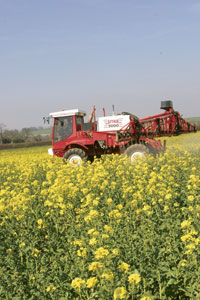Metazachlor restrictions force strategy rethink

New restrictions on the use of metazachlor from this autumn will force some growers to change their weed control strategy in oilseed rape, particularly those growing in a tight wheat-rape rotation.
Under the new rules, growers can apply no more than 1000g/ha of the active ingredient in a three-year period on the same field.
The restrictions were introduced to reduce the risk of metazachlor reaching watercourses, as it has been found in some above EU-permitted drinking water levels, peaking in spring and autumn. The fear is that the active could be withdrawn if there is no reduction in the peaks.
“Growers are reeling from the loss of trifluralin and IPU and this will make life a little harder still,” says Dick Neale, technical manager at Hutchinsons.
However, Mr Neale believes the impact on metazachlor will be “an inconvenience, but not a disaster” for the many growers who don’t grow oilseed rape in more than a one in three rotation.
But for those who are affected, Mr Neale believes it will mean selecting products formulated with lower levels of the active ingredient in combination with another active. Historically, straight metazachlor (Butisan S) has been the popular pre-emergence choice.
These changes concerning metazachlor prompted Nick Anderson, an agronomist at Suffolk’s Agrivice, to take another look at one alternative – napropamide.
Before trifluralin was revoked in 2007, products containing napropamide were used to some extent as pre-emergence options in oilseed rape, says Mr Anderson. Napropamide, which is still legally available for use as a pre-emergence herbicide on oilseed rape, has been largely overlooked since being succeeded by metazachlor.
“Napropamide has not been used widely as a chemical for a number of years, so many growers will be unfamiliar with its strengths and weaknesses and best application practices,” says Mr Anderson.
Napropamide is known to offer good control of a broad spectrum of broadleaved weeds, including mayweeds, shepherd’s needle and cranesbill.
To find out more, Mr Anderson is conducting a trial, with the aim of assessing its value as a pre-emergence treatment in winter oilseed rape, and specifically, the possible benefits of napropamide when used in conjunction with Centium/Cirrus. Results are due later this month.

